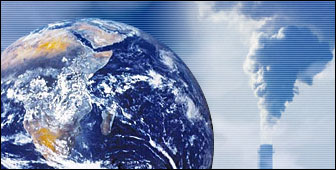WWF warns on Earth resources

A new study has warned that mankind is depleting the world's natural resources so quickly that living standards will go into irreversible decline within 30 years.
Unveiling its fourth “state of the planet” report in Geneva, the conservation group, WWF, said humans are consuming 20 per cent more natural resources – such as fish stocks and forests – than can be regenerated.
By 2050, the Earth’s population – then numbering some nine billion – would be consuming between 180 and 220 per cent of the planet’s biological capacity.
“Humans are running a huge deficit with the Earth,” the group says.
The report comes as a stark warning less than two months before the start of the UN Summit on Sustainable Development in Johannesburg.
Bountiful, but not limitless
“The fact that we live on a bountiful planet, but not a limitless one, presents world leaders with a clear challenge,” says Claude Martin, Director General of WWF International. He adds that reducing poverty is inextricably linked to the need to maintain a balance in nature.
“Unless we ensure the health of those ecosystems, we will never be able to guarantee an acceptable standard of living for much of the world’s population,” Martin says.
The WWF’s concerns are shared by the Swiss government. “We have to take this report very seriously,” says Franz Perrez, head of the global affairs division at the Swiss Environment Agency.
“We cannot say whether it will be as catastrophic as this report suggests, but we agree that pressure on natural resources is now too great and our patterns of consumption and production have to change,” he told swissinfo.
Ecological footprint
In its report, the WWF calculates mankind’s “ecological footprint” – the amount of land and water required to produce the resources consumed by a population and absorb the waste it generates. It calculates that Earth has around 11.4 billion “biologically productive” hectares – or 1.9 hectares per person.
The current “ecological footprint” is 2.3 hectares per person. However, that ranges from 0.8 hectares per person in some African countries to 9.6 in North America. The figure for Europe is five hectares.
This is not only a North-South issue: the disparities between developed countries are also considerable. An average American, for example, consumes four times as much energy as a Swiss, despite having a similar standard of living.
The WWF also maintains a Living Planet Index, which monitors trends in animal populations. In the past 30 years, this Index has fallen by 35 per cent. Hardest hit have been freshwater species, which have declined by 54 per cent. Sea and forest creatures have also been affected by “unsustainable human consumptive pressure”.
“We do not know exactly what the result will be of running up this massive overdraft with the Earth,” says Jonathan Loh, author of the Living Planet report. “What is clear is that it would be better to control our own destiny than to leave it to chance.”
Low expectations
Devising ways of changing consumption patterns will require the political will to come up with a global consensus, and that currently seems to be lacking.
The Johannesburg Summit, which begins in late August, is the follow-up to the Earth Summit in Rio de Janeiro in 1992. Delegates will be faced with the task of coming up with concrete steps to improve people’s lives while at the same time preserving fragile ecosystems.
The prospects for success, though, seem to be slim. The United States’ decision to abandon the Kyoto Protocol on climate change and the relative failure of a preparatory conference in Bali have left expectations low.
In addition, unlike in Rio, no set-piece treaty committing countries to specific goals is due to be signed. Industrialised countries like the United States, Australia and Canada are opposed to formal agreements on sustainable development. It is no coincidence that these countries are among the worst culprits on the WWF’s economic footprint index.
“I am still hopeful, but Johannesburg will not be as successful as Rio. The political commitment is not what it was ten years ago. Our expectations have to be less ambitious,” Perrez says.
“In Rio, the time was ripe for accepting sustainable development as a basis for international politics. The aim of Johannesburg is not to take a further step, but to move from general statements to concrete actions,” he adds.
Global action plan
Perrez says Agenda 21, the global plan of action adopted in Rio, would probably not be agreed today. Too many industrialised countries, he says, now see sustainable development as a challenge rather than an opportunity.
WWF believes action can be taken to reverse the alarming trend outlined in its report. It is campaigning for protected areas in forests and oceans, a phasing out of fossil fuels and subsidies and improved education and health in developing countries in a bid to tackle population growth.
“From the behaviour of many politicians, one could almost think their countries are on a different planet, so little bothered do they seem by the impact of their actions on their own and other societies,” Martin says.
by Roy Probert

In compliance with the JTI standards
More: SWI swissinfo.ch certified by the Journalism Trust Initiative
You can find an overview of ongoing debates with our journalists here. Please join us!
If you want to start a conversation about a topic raised in this article or want to report factual errors, email us at english@swissinfo.ch.